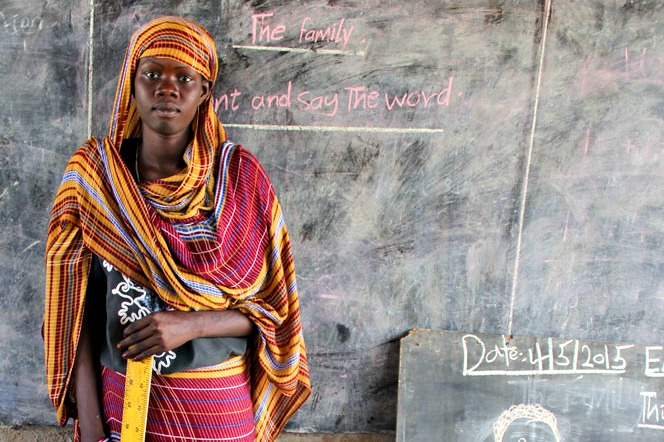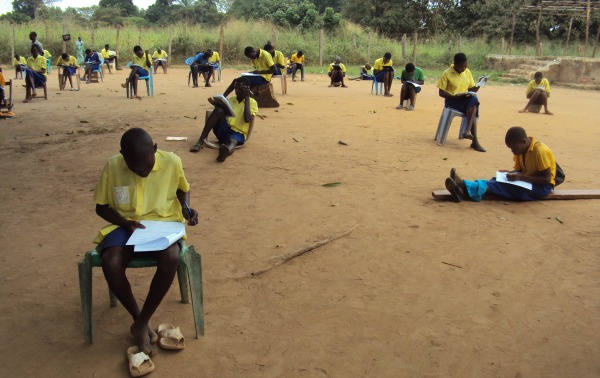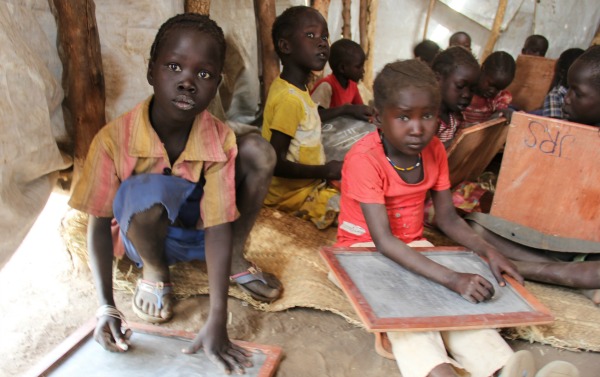
A Sudanese refugee teacher pauses after finishing her courses for morning, before attending JRS teacher training courses in the afternoon.
“I’ve lived through three decades of war and I’ve never experienced as much violence as I did a few weeks ago,” said South Sudanese Sister Elizabeth Waraga, Jesuit Refugee Service (JRS) Education Coordinator who works in Yambio, South Sudan.
Yambio: a safe haven no more
In January 2016, heavy gunfire between government and opposition forces rained on the small South Sudanese town of Yambio. Sister Elizabeth and her colleagues hid for hours.
Yambio used to be a safe haven for internally displaced persons and for those who have returned but has now been added to the list of the nation’s conflict zones. “We’re all terrified to move, and the threat of sexual violence is more prevalent than ever – armed groups have committed sexual violence everywhere, even invading churches to violate women of all ages. Every night we’re drummed with sounds of guns and some days food is non-existent. It wasn’t this horrible during the war with Sudan. Civilians and the Church were protected and respected by all factions, not like today.
“I wonder what is the future for these young people in South Sudan?” added Elizabeth.

Students study after class in Yambio, South Sudan (Aidan Azairwe/Jesuit Refugee Service)
Perseverance amidst growing insecurity
JRS has helped the younger generation in South Sudan to gain access to education for decades. The organisation established itself in Yambio during Sudan’s second civil war. Due to this increasing insecurity, lack of protection, and limited movement, JRS and other humanitarian agencies are struggling to provide an adequate response. But they persevere nonetheless.
In 2015, JRS Yambio served more than 4,000 people through teacher trainings, scholarships for girls and improving school infrastructure. Throughout the year, enrolment in local secondary schools supported by JRS increased by 80 percent and enrolment of girls by 35 percent.
The organisation hopes to continue these projects and begin to offer vocational skills training courses throughout 2016 to more than 1,300 new students. Schools in Yambio are open but enrolment is low. Many students, Elizabeth fears, are seeking refuge far away.
“JRS support for teacher training is very important even in the midst of this chaotic conflict. Teachers here lack skills, but many people, especially girls, want to study and learn. They trust JRS will keep them in school. We hope peace will come so children can reach their classes.”, she said.
{youtube}r1SdqhJGc0w{/youtube}
Education is a tool for peace in a crisis
JRS believes education must remain a priority even amidst the most severe crises. Education is a tool for peace and long-term development and a basic human right that allows people to improve their standard of life regardless of where they may settle down eventually.
The crisis in South Sudan has entered its third year and the likelihood of peace seems further away than ever. Although government and opposition forces signed a peace accord last year, a new plan to divide the country into a further 28 states and continued violations of the agreement have perpetuated further violence into 2016.
Furthermore, both armed groups continue to scale up their weapon acquisition leading to the “expansion of war,” according to a recent African Union report.

The host community in Maban hopes that through spreading education, the younger generation will no longer be involved in cycles of violence (Angela Wells/JRS).
Multiple armed groups are at fault for atrocious violence toward civilians including the burning of villages, destruction of crops, sexual abuse and child conscription as reported by the United Nations. More than 2.3 million people have been displaced since the conflict began in December 2013. As levels of displacement from the conflict in South Sudan reach unprecedented levels, the drive for refugees to learn and build a better future continues.
In Yambio, peace talks among local forces are now underway. But JRS urges that sustained, long-term peace will only come from concerted action and compromise from the highest leadership in South Sudan.
Author: Angela Wells, JRS Eastern Africa Communications Officer.

